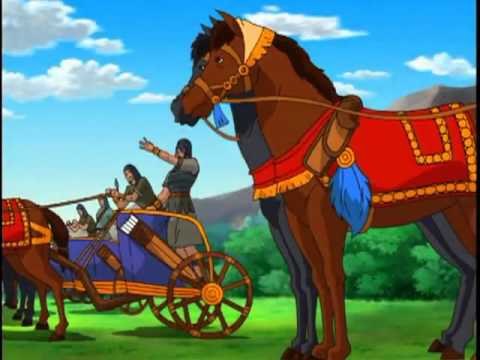The article “Moses dies before reaching the Promised Land” takes you on a journey through the significant events that unfolded after Moses passed away. It highlights the leadership of Joshua, who led the Hebrew tribes to victory against Jericho and settled the Israelites in the Land of Canaan. The article also explores the Israelites’ struggle with idolatry, leading to Jehovah sending judges like Deborah and Gideon to guide the tribes and provide salvation. These captivating stories of faith, war, and redemption will leave you inspired and in awe of the power of God’s guidance throughout history.
As the article progresses, it delves into the challenges faced by the Israelites, their conflicts with neighboring nations, and their eventual return to worshiping God. It chronicles the rise of Deborah as a judge and prophet to save her people from oppression, along with the courageous battles fought by Barak against Jabin and Sisera. Gideon’s appointment by God and his strategic use of a small army to defeat the Midianites further exemplify the strength and faith displayed by the Israelites. In the face of adversity, these stories remind us of the importance of recognizing and staying true to our faith in order to overcome obstacles and find peace.
Moses’ Death

This image is property of i.ytimg.com.
Moses’ role as a leader
Moses was a remarkable leader who played a crucial role in the history of the Hebrew people. He was chosen by God to lead the Israelites out of slavery in Egypt and guide them through their journey in the wilderness. Moses served as a mediator between God and the people, receiving the Ten Commandments on Mount Sinai and establishing the laws and principles that would govern the nation. His leadership and guidance were instrumental in shaping the identity and faith of the Hebrew people.
Moses’ final moments
Despite his significant contributions, Moses did not have the opportunity to enter the Promised Land. After leading the Israelites for 40 years, Moses’ journey came to an end on Mount Nebo. God showed him the land that He had promised to give to Abraham, Isaac, and Jacob but told him that he would not be able to enter it. With a heart full of love for his people, Moses blessed them before his passing and transferred leadership to Joshua. It was a poignant moment as the Israelites mourned the loss of their beloved leader, but also looked forward to the future under Joshua’s guidance.
Legacy of Moses
Moses’ legacy is one of unparalleled faith and devotion to God. He is remembered as one of the greatest prophets and leaders in history. His obedience and willingness to follow God’s commands, even in the face of adversity, serves as an inspiration to believers today. Moses’ teachings and the laws he established are still studied and followed by many, as they provide a foundation for moral living and a deep connection to God. Though he did not physically enter the Promised Land, Moses left an indelible mark on the Hebrew people, paving the way for their future and setting the stage for the fulfillment of God’s promises.
Leadership Transition to Joshua
Joshua appointed as the successor
After Moses’ death, the responsibility of leading the Israelites fell to Joshua. He had been Moses’ faithful assistant and had already established himself as a capable and courageous leader. God Himself appointed Joshua as the successor, reaffirming His presence and guidance to the people. Joshua’s appointment brought comfort and assurance to the Israelites during this time of transition.
Challenges faced by Joshua
Taking over from Moses was no easy task. Joshua had to lead the Israelites in conquering the Promised Land, facing formidable enemies along the way. The Israelites had to overcome their own doubts and fears, as well as navigate the complex dynamics of waging war and establishing a new society. Joshua faced the challenge of uniting the tribes and instilling confidence and faith in the people as they embarked on this monumental undertaking.
Overcoming obstacles
Under Joshua’s leadership, the Israelites faced numerous obstacles, but with God’s guidance, they were able to overcome them. The miraculous crossing of the Jordan River, the conquest of Jericho, and the triumph in battle against their enemies demonstrated God’s faithfulness to His promises and His power to deliver His people. Joshua’s unwavering trust in God and his commitment to following His commands were instrumental in leading the Israelites to victory and establishing their place in the Promised Land.
Victory Against Jericho
Israelites’ arrival at Jericho
After the death of Moses and the leadership transition to Joshua, the Israelites arrived at the city of Jericho. This marked a significant milestone in their journey towards claiming the Promised Land. The walls of Jericho were a formidable barrier, and their conquest was seen as a crucial test of the Israelites’ faith and commitment to God.
The fall of Jericho’s walls
Upon their arrival at Jericho, the Israelites followed God’s instructions to march around the city once every day for six days. On the seventh day, they circled the city seven times before letting out a great shout. Miraculously, the walls of Jericho collapsed, allowing the Israelites to enter the city and seize it. This event showcased the power and faithfulness of God, solidifying the Israelites’ belief in His ability to lead them to victory.
Importance of the victory
The victory against Jericho was of paramount importance to the Israelites. It served as a symbolic and tangible demonstration of God’s presence with them and His faithfulness to fulfill His promises. The conquest of Jericho gave the Israelites a newfound confidence and strengthened their resolve as they continued their journey into the Promised Land. It also served as a testament to the power of unity and obedience to God’s commands, highlighting the significance of faith and trust in achieving victory.
Settling in the Promised Land
Israelites’ journey to Canaan
The Israelites’ journey to Canaan was marked by various challenges and trials. They endured the hardships of desert living and faced opposition from enemies along the way. The journey served as a transformative experience, molding the Israelites into a unified nation and preparing them for the task of settling in the land that God had promised to them.
Establishing territories
Once in Canaan, the Israelites faced the arduous task of establishing territories and carving out a place to call home. The land was inhabited by various other tribes and nations, necessitating military campaigns to secure the Israelites’ territory. Each tribe was assigned its own portion of land, delineating their respective territories and setting the stage for the development of a settled society.
Challenges in settling
The process of settling in Canaan was not without its challenges. The Israelites had to contend with external threats, guerrilla warfare, and the temptation to assimilate with the surrounding cultures. They faced temptations to abandon their faith and adopt the practices and beliefs of the Canaanites. The Israelites’ ability to overcome these challenges and remain faithful to God’s commandments was crucial in securing their place in the Promised Land.
Deviation from True Worship
Israelites’ abandonment of God
Unfortunately, the Israelites did not remain steadfast in their faith. Over time, they started to abandon the worship of the true God and turned to idolatry. This deviation from true worship deeply grieved God and had severe consequences for the Israelites.
Worshiping Baal
One of the primary idols that the Israelites turned to was Baal. Baal was a Canaanite deity associated with fertility and agricultural prosperity. The Israelites began to worship Baal and engage in the detestable practices associated with his worship. This betrayal of their covenant with God resulted in dire consequences for the Israelites and their relationship with Him.
Consequences of idolatry
As a consequence of their abandonment of true worship, the Israelites experienced a series of calamities and hardships. They fell into the hands of their enemies, their land was ravaged, and they suffered immense loss. These trials were designed to teach the Israelites the folly of their idolatry and to bring them to a place of repentance and restoration.
Sending of Judges
Jehovah’s intervention
In response to the Israelites’ cries for deliverance, Jehovah intervened by sending judges to lead and rescue the Hebrew tribes. These judges were chosen by God and bestowed with His authority to govern the people and dispense justice. Through the judges, God sought to guide the Israelites back to a place of righteousness and obedience.
Purpose of judges
The judges served a multifaceted role within the community. They acted as military leaders, delivering the Israelites from their enemies and securing the safety of the nation. Additionally, the judges served as mediators between God and the people. They were tasked with upholding God’s law, settling disputes, and leading the Israelites in matters of faith.
Examples of judges
Several judges arose during this period of Israelite history, each playing a unique role in the nation’s spiritual and military restoration. Two notable judges were Deborah and Gideon. Deborah displayed exceptional leadership and prophetic wisdom, leading the Israelites to victory against the oppressive rule of Jabin and his commander, Sisera. Gideon, chosen by God as a deliverer, led a small but mighty army against the vast forces of the Midianites, securing a resounding victory and restoring peace to the land.
Deborah’s Leadership and Prophetic Role
Deborah as a judge and prophetess
Deborah was a remarkable leader who served as both a judge and a prophetess during a critical time in Israelite history. She was known for her wise counsel and her ability to discern God’s will. Deborah’s leadership was instrumental in rallying the Israelites and inspiring them to rise up against their oppressors.
Oppression by Jabin and Sisera
During Deborah’s time, the Israelites were under the oppressive rule of Jabin, the king of Canaan. His commander, Sisera, was a formidable foe who posed a great threat to the Israelites. Under their rule, the Israelites endured great suffering and lived in fear. Deborah recognized the need for deliverance and was chosen by God to lead the charge against their oppressors.
Deborah’s victory
With Deborah’s guidance, the Israelites were able to secure a resounding victory against Jabin and Sisera. Deborah’s strategic wisdom, coupled with the bravery of Barak, led to the defeat of the Canaanite forces. This victory was a testament to Deborah’s leadership and the faithfulness of God in fulfilling His promises to His people. Deborah’s role as both a judge and a prophetess set the stage for the subsequent judges who would continue to guide and lead the Israelites.
Gideon’s Divine Calling
God’s choice of Gideon
Gideon was an unlikely hero chosen by God to save the Israelites from the oppressive rule of the Midianites. Though initially hesitant and full of doubts, Gideon stepped into his calling with faith and obedience. God saw in Gideon the potential for greatness, even when Gideon did not see it in himself.
Midianite oppression
The Midianites were fierce invaders who oppressed the Israelites for many years. They would invade the land, stealing crops and livestock, causing the Israelites great hardship. It was under the weight of this oppression that Gideon was called forth to rise up and defeat the Midianites.
Gideon’s unconventional tactics
Gideon’s faith was tested through a series of unconventional tactics that God instructed him to employ. Despite initially having a large army at his disposal, God whittled down Gideon’s forces to a mere 300 men. These men were armed with trumpets, torches, and empty jars. Through this unconventional and seemingly disadvantageous plan, God demonstrated His power, granting Gideon and his men a remarkable victory over the Midianites.
Gideon’s Victory over the Midianites
Gideon’s small army
Gideon’s army of 300 men stood in stark contrast to the vast and mighty Midianite forces. This small and disparate group seemed ill-equipped to take on such a formidable enemy, but God’s strength was made perfect in their weakness. Gideon’s faith and obedience, coupled with the divine intervention of God, turned the tide in their favor.
Divine strategy and guidance
God orchestrated a brilliant strategy for Gideon’s victory. Through a dream and a divine sign, Gideon received clear instructions from God on how to defeat the Midianites. By dividing his small army into three groups, surrounding the Midianite camp, and utilizing the element of surprise, Gideon was able to create confusion and fear amongst the Midianites. God’s hand was evident throughout the battle, granting Gideon and his men a decisive victory.
Defeat of the Midianites
Through God’s power and Gideon’s leadership, the Midianites were defeated and the land was freed from their oppression. This victory brought peace and security to the Israelites, allowing them to thrive in their land. Gideon’s courage and faith, coupled with the divine intervention of God, ensured the Israelites’ triumph over their enemies.
Conclusion
Lessons learned from Moses’ death
Moses’ death serves as a reminder that even great leaders have their limitations. No matter how significant their contributions, they are ultimately finite beings. It emphasizes the importance of passing the torch and ensuring the continuation of leadership and guidance for future generations. Moses’ death also highlights the transient nature of life and the need for believers to remain steadfast in their faith.
Continued cycles of faithfulness and unfaithfulness
The Israelites’ journey serves as a stark reminder of the recurring cycles of faithfulness and unfaithfulness that the people experienced throughout their history. Despite witnessing God’s miracles and deliverance, they would often stray from their devotion to Him, leading to painful consequences. This pattern emphasizes the importance of remaining steadfast in faith and continuously seeking God’s guidance.
Importance of obedience and true worship
The stories of Moses, Joshua, Deborah, and Gideon all underscore the significance of obedience and true worship. The Israelites’ deviation from God’s commandments and their embrace of idolatry caused great suffering and led to their downfall. Conversely, when leaders and people remained faithful and obedient, they experienced God’s blessings, protection, and deliverance. These narratives serve as a timeless reminder of the importance of obedience, worshiping the true God, and remaining steadfast in faith.







